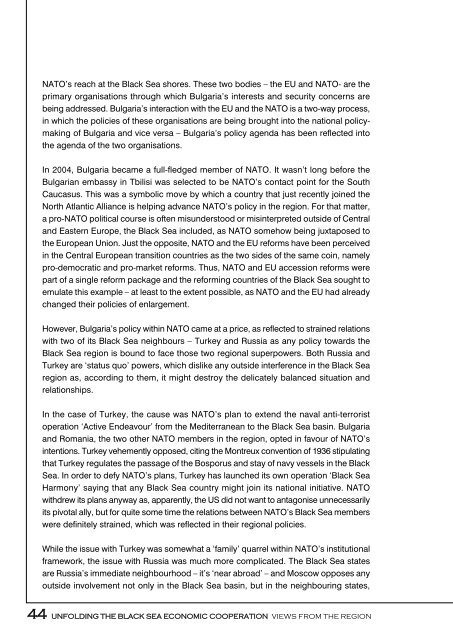Xenophon Paper 2 pdf - ICBSS
Xenophon Paper 2 pdf - ICBSS
Xenophon Paper 2 pdf - ICBSS
Create successful ePaper yourself
Turn your PDF publications into a flip-book with our unique Google optimized e-Paper software.
NATO’s reach at the Black Sea shores. These two bodies – the EU and NATO- are the<br />
primary organisations through which Bulgaria’s interests and security concerns are<br />
being addressed. Bulgaria’s interaction with the EU and the NATO is a two-way process,<br />
in which the policies of these organisations are being brought into the national policymaking<br />
of Bulgaria and vice versa – Bulgaria’s policy agenda has been reflected into<br />
the agenda of the two organisations.<br />
In 2004, Bulgaria became a full-fledged member of NATO. It wasn’t long before the<br />
Bulgarian embassy in Tbilisi was selected to be NATO’s contact point for the South<br />
Caucasus. This was a symbolic move by which a country that just recently joined the<br />
North Atlantic Alliance is helping advance NATO’s policy in the region. For that matter,<br />
a pro-NATO political course is often misunderstood or misinterpreted outside of Central<br />
and Eastern Europe, the Black Sea included, as NATO somehow being juxtaposed to<br />
the European Union. Just the opposite, NATO and the EU reforms have been perceived<br />
in the Central European transition countries as the two sides of the same coin, namely<br />
pro-democratic and pro-market reforms. Thus, NATO and EU accession reforms were<br />
part of a single reform package and the reforming countries of the Black Sea sought to<br />
emulate this example – at least to the extent possible, as NATO and the EU had already<br />
changed their policies of enlargement.<br />
However, Bulgaria’s policy within NATO came at a price, as reflected to strained relations<br />
with two of its Black Sea neighbours – Turkey and Russia as any policy towards the<br />
Black Sea region is bound to face those two regional superpowers. Both Russia and<br />
Turkey are ‘status quo’ powers, which dislike any outside interference in the Black Sea<br />
region as, according to them, it might destroy the delicately balanced situation and<br />
relationships.<br />
In the case of Turkey, the cause was NATO’s plan to extend the naval anti-terrorist<br />
operation ‘Active Endeavour’ from the Mediterranean to the Black Sea basin. Bulgaria<br />
and Romania, the two other NATO members in the region, opted in favour of NATO’s<br />
intentions. Turkey vehemently opposed, citing the Montreux convention of 1936 stipulating<br />
that Turkey regulates the passage of the Bosporus and stay of navy vessels in the Black<br />
Sea. In order to defy NATO’s plans, Turkey has launched its own operation ‘Black Sea<br />
Harmony’ saying that any Black Sea country might join its national initiative. NATO<br />
withdrew its plans anyway as, apparently, the US did not want to antagonise unnecessarily<br />
its pivotal ally, but for quite some time the relations between NATO’s Black Sea members<br />
were definitely strained, which was reflected in their regional policies.<br />
While the issue with Turkey was somewhat a ‘family’ quarrel within NATO’s institutional<br />
framework, the issue with Russia was much more complicated. The Black Sea states<br />
are Russia’s immediate neighbourhood – it’s ‘near abroad’ – and Moscow opposes any<br />
outside involvement not only in the Black Sea basin, but in the neighbouring states,<br />
44 UNFOLDING THE BLACK SEA ECONOMIC COOPERATION VIEWS FROM THE REGION









